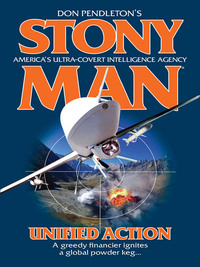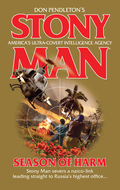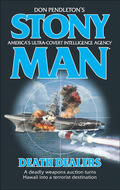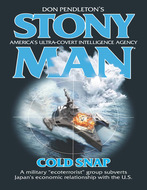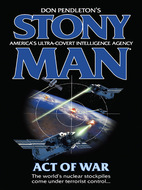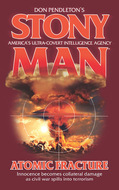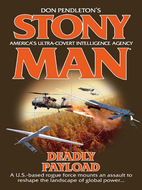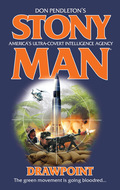Kitap dosya olarak indirilemez ancak uygulamamız üzerinden veya online olarak web sitemizden okunabilir.
Kitabı oku: «Unified Action»
ENEMY VEHICLES FLARED LIKE BONFIRES IN VIOLENT CONFLAGRATIONS
Gary Manning raked the milling al Qaeda combatants with his machine gun as Hawkins methodically executed any gunman who came into his crosshairs.
Having used RPGs to disable every vehicle in the convoy, both Calvin James and Rafael Encizo traded out their rocket launchers for Soviet-era submachine guns. Moving quickly under the cover fire, David McCarter prepared to lead the assault element down the cliff face to overwhelm any resistance.
“Move! Move! Move!” McCarter barked.
As one, the three-man fire team surged forward over the lip of the steep incline. The deployed lines were flung out in front of them. They ran face-first in an Australian-style rappel down the steep incline, one hand running the guideline, the other firing their weapons from the hip using a sling over the shoulder of their firing hand to steady the muzzle.
The loose gravel gave way in miniature avalanches under their feet as they sprinted down the incline, ropes whizzing through the gloves on their hands. The light from burning vehicles cast wild shadows and threw pillars of heat up toward them. It felt as if they were running straight into the open mouth of hell.
Unified Action
Don Pendleton
STONE MAN ®
America‘S Ultra-Covert Intelligence Agency
Unified Action
CONTENTS
CHAPTER ONE
CHAPTER TWO
CHAPTER THREE
CHAPTER FOUR
CHAPTER FIVE
CHAPTER SIX
CHAPTER SEVEN
CHAPTER EIGHT
CHAPTER NINE
CHAPTER TEN
CHAPTER ELEVEN
CHAPTER TWELVE
CHAPTER THIRTEEN
CHAPTER FOURTEEN
CHAPTER FIFTEEN
CHAPTER SIXTEEN
CHAPTER SEVENTEEN
CHAPTER EIGHTEEN
CHAPTER NINETEEN
CHAPTER TWENTY
CHAPTER TWENTY-ONE
CHAPTER TWENTY-TWO
CHAPTER TWENTY-THREE
CHAPTER TWENTY-FOUR
CHAPTER TWENTY-FIVE
CHAPTER TWENTY-SIX
CHAPTER TWENTY-SEVEN
CHAPTER TWENTY-EIGHT
CHAPTER TWENTY-NINE
CHAPTER THIRTY
CHAPTER THIRTY-ONE
CHAPTER ONE
Michael Klaus understood how the world worked.
The world was predicated on profit. In the end all that mattered was profit, and Klaus had no patience for weaker men who refused the obvious nature of this truth.
There simply wasn’t enough to go around. In Klaus’s opinion no political system that attempted to address a shortage of equality had worked, and none ever would. The world of haves and have-nots was built on Darwinian fitness where survival was its own justification. Pity, mercy, empathy, justice—these were theoretical concepts that held no place in the jungle lives of humankind.
Michael Klaus would be king of the jungle, by any means necessary.
Klaus stood in front of the floor-to-ceiling windows of his master office suite. He shot the cuffs on a tailored suit and ignored the prostitute as he made his own way out of the lavish room. The lisping Adonis had an envelope of cash and bite marks on his back to remember his visit by. If he was wise and didn’t wish to be found floating facedown in the bay, he’d practice discretion.
Outside over the dark waters of the northern Atlantic dark clouds were piling up on the horizon. Klaus could see whitecaps forming from the stiff breeze that was beginning to hit the beach like a company of shock troops. He imagined it was quite cold out there. He didn’t know firsthand, since he was inside, secured from the environment, untouchable. Insulated. He preferred things this way. He picked up an ultraslim wireless and pressed the push-to-talk button with a manicured finger adorned with a heavy gold ring.
“Ms. Applebaum, is Mr. Skell waiting for me?”
“Yes, Mr. Klaus,” his personal assistant answered immediately. “Shall I send him in?”
“Yes, please.”
Klaus believed in impeccable manners. It was part of the charade, part of the mask of civilization he wore the way any ambush predator blended into its background.
He glanced at the Rolex Executive watch on his thin wrist. The heavy walnut door behind him opened and then closed, but Klaus didn’t turn around. The corporate magnate remained facing his windows, taking in the view.
“I trust you are well, Mr. Skell?”
“I am, sir,” the chief legal officer answered.
On the left of the room a massive aquarium served as a divider between the section of the office suite containing Klaus’s desk and a sunken living-room area where more informal negotiations or conversations took place. Skell crossed to this area and helped himself to a tumbler of single-malt Scotch whiskey. He drank it neat, and it went down in a single swallow without a flinch with a practiced flick of his wrist.
“Well?” Klaus asked.
“Have corporate security made an anti-electronic measures sweep?”
“This morning. Would I talk so openly otherwise?” There was a slight undercurrent to Klaus’s voice now.
Skell, long used to his employer’s moods, sensed it immediately. “I apologize,” he said hastily. “We’re close now and perhaps the stress is getting to me.”
“Perhaps some time alone with all that Thai child porn you’ve collected?” Klaus offered quietly. “Would that relax you?”
Skell winced at the unsubtle reminder of who was master and who was servant. Klaus turned away from the window and looked at him for the first time. He saw a pudgy, balding man with soft hands, a weak chin and slumped shoulders in a suit as expensive as his own. He also saw a brilliant legal pirate with the eyes of a serial killer.
“Why don’t you tell me about our progress?” Klaus offered.
“Everything has gone according to schedule. We found a team of Mossad investigators snooping around in the periphery of our operations but we were able to feed them enough disinformation that they were put onto the wrong track.”
“And the Americans?”
“Officially? Quiet. We’re still well below their radar.”
“Unofficially?”
Skell paused. “There is a…complication,” he admitted.
Klaus slowly put his hands behind his back and pursed his lips. Deliberately he walked forward on expensive Italian loafers. He stopped beside his deck and removed a cigarette from a box on the tabletop and lit it. “Go on,” he said. His words came out in a cloud of blue smoke.
“Two contractors,” Skell began, “working separate aspects of the project. It turns out they were brothers.”
“That was an unfortunate oversight on the part of personnel.”
“They were working for different companies on different sites. One in Southwest Asian operations, the other at the Santo Domingo office.”
As Skell talked Klaus began to move again, trailing cigarette smoke behind him like the front stack on a locomotive. Skell’s knuckles were white around the cut-crystal liquor tumbler in his hands as he felt Klaus getting closer. He knew better than to turn around.
“Don’t we have software indigenous to our record-keeping system that catches this sort of thing?”
“There was a delay in linking the information.” Skell paused slightly. “The employee responsible for such activities has been reprimanded.”
Klaus was close enough behind him now that Skell could smell the man’s cologne. Fat beads of sweat broke out on the lawyer’s bald pate. A heavy hand settled on his right shoulder, then a second fell on his left. Klaus was so close behind him now he could feel the heat of the man’s body.
“Did you do the reprimanding yourself, then?” Klaus asked. His face was so close beside Skell that the question was a whisper in the man’s ear. Cigarette smoke enveloped his head in a cloud, forcing Skell to cough slightly.
“Yes. Yes, I did.”
“Good,” Klaus whispered. Abruptly the German turned and walked back across the room toward his desk, where he ground out the cigarette. “Was there a compromise?”
“We believe so.”
“And?”
“And I think the two know enough to make them curious, to realize there’s a bigger picture, but not enough to make them go to the authorities—yet.”
“Fine. You know what to do, then, correct?”
“I’m putting it into motion right now.”
Klaus walked back over to the windows and clasped his hands behind his back. He stared out at the ocean now roiling under the windstorm hammering the shore.
“That’ll be all.”
HALF AN HOUR LATER Skell sat in the back of a plush company limousine. He swallowed a fistful of antacid tablets, two aspirin and a Xanax and washed them down with a swig of bottled water. His hands were clammy from his perspiration, and when the two men got into the back of the limo with him he didn’t offer to shake hands.
The first man wore a closely shaved haircut and a shrapnel scar that ran along one jawline. His name was Haight and he’d been a sergeant in the French Foreign Legion for ten years before opting to work freelance.
Haight was tall but lean, whipcord thin and possessing the build of an endurance hunting animal like a greyhound or a cheetah. In contrast, the onyx-skinned man who got in behind him was built like a bear.
Robert Skah Lemis had come up on the hard streets of Santo Domingo the rough way. From gang member to police officer to political assassin, he had excelled in making useful connections. He turned chaotic masses of violent, unorganized individuals into functioning syndicates. Money. Guns. Lawyers. In the Caribbean, Lemis controlled and coordinated these things. It had made him very important to Mr. Skell because it allowed the sweating pedophile to look good for his boss, the unforgiving Mr. Klaus.
Skell blinked behind his glasses, his eyes as beady as they were myopic. Haight smelled like aftershave and Lemis smelled like marijuana. The tip of his tongue looked pink and vaguely sluglike against the fat cupid bow of his pursed lips. A sheen of sweat covered him, casting an unhealthy aurora.
“Here,” he said briskly.
He opened a titanium briefcase covered in a thin layer of calfskin and set with gold fixtures. From inside he pulled out two flash drives and handed them to the mercenaries sitting across from him. Both men took great pains to ensure their hands didn’t touch Skell’s.
As the two middle managers placed the flash drives inside their coat pockets Skell gave them a brief rundown.
“Each flash drive contains information on men we want captured, interrogated and disposed of. Ironically, but unimportant to you, the men are brothers named Smith. One is currently an FBI agent on liaison in the Dominican Republic, and the other is a private military contractor flying unmanned aerial vehicles on surveillance missions in Kyrgyzstan. They learned something they shouldn’t have. The details will be provided in the digital briefings.
“Once we’ve figured out how much they discovered, we won’t need them anymore. Put together your teams, arrange transportation, perform the captures, conduct the interrogations, dispose of the bodies. We need this done fast and we are willing to provide you a fifteen percent bonus over and above our normal understandings.”
Lemis grinned. His mouth was huge and his white teeth lit up his face like lights on a Christmas tree. “That’s good stuff. I’ll have the motherfucker wrapped up like candy in a day.”
Haight frowned. “My end isn’t going to be so tidy. A job like this I’m going to have to use ex-Soviet troops. Bulgarians for the interviews, Russians for the shock troops. I go open market, I can’t promise they won’t run their mouths off about doing an American to inflate their rep. I go with quiet professionals, I run the risk of getting boys tied in closely with the intelligence services or the syndicates.” He leaned back in his seat and shrugged his shoulders. “If we were doing this in Africa it might be a different story…but Kyrgyzstan?”
Skell drew his lips together, forming his mouth into a pout. “Total unit closure?” he suggested.
Haight shook his head. “Too large a crew on this one. I recruit twenty shooters and one or two spooks, then they all turn up missing, I’m fucking done.”
“Fine. Use people who can keep their mouth shut. We have ways of dampening down the exposure on the intelligence front.” Mentally he adjusted the cost expenditure for the operation. He frowned slightly, then decided it was obviously still cost-effective given the alternative.
Once the American dollar had been devalued the resulting profit margin from Mr. Klaus’s currency speculation would be so considerable that a few million-dollar bribes to Russian generals at the old Kremlin would hardly be missed.
CHAPTER TWO
Southern Caribbean
The NA-265—60 Saberliner Jet cut through the air at well over 500 mph. Below the forty-four-foot wingspan wisps of clouds obscured the view of the Caribbean Ocean. To the west the sun was setting in an explosion of reddish-yellow light.
The civilian jet was flown by a skeleton crew of three pilots from the Central Intelligence Agency’s clandestine service, while in the passenger area the three operators of Able Team lounged after being picked up after a mission in the Uruguay capital of Montevideo.
Big, blond and built like a nightclub bouncer, Carl Lyons reclined in one of the plush seats and stared out the window. Wearing civilian clothes and tan, thick-soled hiking boots, he looked rumpled, dirty and tired. One knee of his jeans was stained with blood splatter and his hands smelled like cordite. He set down his can of soda and crossed one size-twelve boot over his knee.
He noticed absentmindedly that the toe and tread of his boot were flecked with brain matter. He turned to look at the mustached, sandy-haired man sprawled in the seat across the narrow aisle from him.
“You think you used enough Semtex in that last satchel charge?” Lyons asked, voice dry.
Hermann Schwarz shrugged as he opened a can of soda. He took a long drink, then shrugged again.
“Don’t know,” he admitted. “I mean, the door came open. Right?”
“Every ass clown in that FARC hit squad came out the opening looking like fruit in a blender,” Rosario Blancanales pointed out.
“Did I tell ’em to carry a suitcase full of grenades?” Schwarz countered.
“Barb’s going to be pissed we didn’t recover any intelligence artifacts,” Lyons pointed out. The leader of Able Team referred to Barbara Price, the mission controller at their organizational headquarters, Stony Man Farm.
“I’m really more of an engineer and less of an archaeologist,” Schwarz answered.
“Who said anything about archaeologists?” Lyons demanded.
“It was a play on the dual use of the term ‘artifact’ you mentioned,” Blancanales explained.
“Thank you,” Schwarz said.
“It was also stupid and obvious,” Blancanales continued.
“Thank you,” Lyons said.
The digital speakers of the Saberliner’s PA system cut on and the pilot’s voice, sounding well modulated and distant, cut in. “I got an alert from HQ,” the woman said. “You have a fragmentation order. Please access the communications display in your table.”
“Speaking of Mama Bear…” Blancanales grinned.
Reaching out a single blunt finger, Lyons jabbed it into the console button. A section of the desktop slid back to reveal a recessed screen and keyboard. A red light next to a digital camera blinked on and the blank image on the screen snapped into resolution, revealing the attractive features of the honey-blond Stony Man mission controller, Barbara Price.
“Good work in Uruguay,” Price said. “I’ve got something new for you.”
From behind the television Blancanales snorted in laughter. “I wish she’d knock it off already with all the chitchat and get to business.”
“No shit,” Schwarz muttered.
Lyons scowled in their direction out of habit. “Go ahead, Barb,” he said.
“Hal just got a request through the Justice Department,” Price started, referencing Hal Brognola, the director of the Sensitive Operations Group which oversaw Stony Man Farm and its teams. “An investigative liaison for the FBI assigned to the Dominican Republic went missing twelve hours ago.”
“I’m not tracking,” Lyons said with a frown. “This doesn’t sound like an Able operation.” Looking down, he saw the blood splatter on his boot. “At all,” he added.
“We have three major problems,” Price began.
“Here it comes,” Schwarz said.
“One, the agent’s mission was twofold. Ostensibly he was helping with money-laundering operations used by international drug cartels. For that assignment he was given a Dominican counterpart. Partway into that investigation he came across evidence of corruption within the nation’s security services.”
“Gasp.” Blancanales shook his head.
“He was instructed to keep a low profile and to build a file to be turned over to the State Department. He went to meet a confidential informant and failed to make his last two check-ins.”
“Surely the Feds have protocols for that?” Lyons pointed out.
“They do,” Price answered. “The problem is that six hours ago police forces opened fire on an eighteen-year-old boy in a Santo Domingo ghetto. The police claimed the boy was resisting arrest, but witnesses claim he was unarmed. It turned out the boy was the son of the president’s chief political opponent.”
“Uh-oh,” Schwarz said. “The plot thickens.”
“Street gangs loyal to the opposition party immediately began rioting. The government responded with force and the unrest has now spread to all major parts of the city. The consulate is locked down. Nonessential personnel have been choppered out to Navy ships offshore. The city is locked down under martial law and the State Department has declared the Dominican a nonpermissive area.”
“Meaning no unescorted diplomats or government personnel,” Lyons finished.
“The government has refused to give sanction to any retrievals or investigations by us until the civil unrest has been contained,” Price said.
“And all the evidence wiped clean,” Blancanales added.
“Your pilot has been given her new flight instructions. You’ll touch down at the auxiliary executive airport just outside of town. To clear customs you’ll have to come out of this plane without the gear you used in Uruguay. Someone from the consulate will be waiting for you. Carmen has just sent the coordinates to a joint CIA/DEA safehouse to Schwarz’s BlackBerry. Go there, equip and go over what files we got on the missing agent’s case.”
“Sounds good,” Lyons said and nodded.
“Remember,” Price added. “We have no Dominican liaison for you. We do not have permission to operate. The city is locked with riots and under martial law. As far as we are concerned, the FBI’s contacts in Santo Domingo are compromised. This is going to be hairy.”
Schwarz looked at his teammates. “What’s new?” he asked.
Stony Man Farm, Virginia
INSIDE THE communications center of the underground Annex, Barbara Price clicked off the screen to the communications relay station and slowly turned in her chair. She saw Aaron “Bear” Kurtzman, leader of the Stony Man cyberteam, waiting for her. The burly man was sitting comfortably in a motorized wheelchair outfitted with an array of computer uplinks and interfaces.
There were two steaming mugs of coffee in his huge paws. He leaned forward and handed one to Price, who took it gratefully. She sipped at the coffee and looked up in surprise.
“This is great!” she sputtered. “You made this?”
Kurtzman grinned from behind his mug, suddenly self-conscious. “Yeah…I really don’t know what happened.”
“Is Phoenix in the conference room?”
“McCarter and James are,” Kurtzman replied. Price rose and began walking. “The rest of them are at the equipment cages getting gear ready for the airlift.”
“Good,” Price said, exiting the communications center.
Kurtzman followed the woman as she strode quickly down the hallway, pulling an iPhone free. Carmen Delahunt, the red-haired ex–FBI agent, came up and offered Price a form.
“Requisitions needs your signature for the AT-4s,” the woman explained.
Price shifted her phone to the crook of her shoulder and scrawled her name across the form. On the phone the connection clicked into place.
“Go for Brognola,” Hal Brognola said in his usual gruff voice.
“What are you doing?” Price asked.
She began walking again and the motor of Kurtzman’s chair whined as he followed her down the hall.
“Trying to ram our budget past the cabinet,” he replied. “You realize we use more ammunition than the entire United States Marine Corps in a year?”
“Even now?”
“Even now,” the big Fed said drolly. “What can I do for you? Able en route?”
“Able’s scrambling for the Dominican,” she confirmed.
She spun on her heel and shoved open the door to the Annex conference room, barging in to see Phoenix Force leader David McCarter and team medic Calvin James waiting for her.
“Phoenix?” Brognola demanded.
“That’s why I’m calling,” Price replied.
She pointed a finger at Kurtzman, then at the wall and the tech administrator worked a sequence on his chair-mounted keyboard. Instantly the plasma wall monitor sparked into life and went to its default setting of a global atlas.
“What do you need?”
On the screen the geographical image was overlaid with two thin red lines, one for latitude and one for longitude. Wherever the two lines intersected, a box formed, capturing the terrain and political information of any spot on the planet. Kurtzman worked a mouseball on his keyboard.
“Before I scramble Phoenix,” Price continued, “I need to know if I’m going to get overflight permission from Uzbekistan or if we have to get a plane capable of maintaining enough altitude to avoid detection during the insertion.”
“Just a second,” Brognola said. “Let me call a general at Stratcom to sense the general impression before I try to get it authorized.”
“I’ll hold,” Price said.
Calvin James, former Navy SEAL, turned toward the Phoenix Force leader, David McCarter. “We’re going to Kyrgyzstan.”
McCarter, a former British Special Air Service commando, shook his head. “Nah, Tajikistan. They’ve been having problems north of Kabul lately.”
“Kyrgyzstan,” James replied stubbornly.
“Twenty spot on it?”
“Done.” James shook the fox-faced Briton’s hand.
On the screen the lat and long lines settled over central Asia. The political lines showing the border of Kyrgyzstan with China on the right and Tajikistan on the south and Kazakhstan to the north and west showed up. Then the mountain range in the southeast of Kyrgyzstan was pulled up in vivid relief reading.
“Pay up, limey.” James smirked.
McCarter scowled good-naturedly. “I’ll get you in a bit.”
“You’re worse than Hawkins about paying up.”
“All right,” Price interrupted. “While I’m waiting for Hal to check this angle, we’ll move forward. This operation is a supplementation to an operational focus initiated by Joint Special Operations Command. We’re going to be performing direct-action missions based on information fed us by the Intelligence Support Activity,” Price explained, referencing the Pentagon unit tasked specifically with providing tactical information to special operations forces independent of civilian intelligence agencies. “What do you know about Kyrgyzstan?”
James shrugged. “There are clashes going on between progovernment and opposition forces. The government is threatening to balkanize, making the whole area highly unstable. There’ve been increased activity of extremist groups in the area. Most especially the Islamic Movement of Uzbekistan, or IMU, a terror group with direct links to al Qaeda.”
“Those are our boys,” Price said. “We have good intel they’re planning attacks on U.S. government facilities in the region. JSOC has had to shift too many assets south into Pakistan because of increased Taliban activity in the northwest border region there. They asked if we could send you boys to war.”
McCarter sat up. “Straight fights?”
“Is anything you do straight?” Kurtzman asked.
McCarter looked at him. “I’m not quite sure how to take that, mate.” He paused, then lifted an eyebrow. “Are you flirting with me, Bear?”
“Yes. Yes, I am,” Kurtzman said and nodded.
“If we’re done playing eHarmony.com do you think we could get back to the briefing?” Price asked.
“We’re going after bad guys?” James asked.
“Hunter-killer operation, search and destroy,” Price confirmed.
“I’m so happy,” McCarter replied.
Santo Domingo, Dominican Republic
THE SABERLINER BANKED hard as it made its approach.
Out their windows the members of Able Team could see several columns of thick, black smoke roiling up as the city burned. Dominican politics started at the street level and worked its way up. Public housing units and neighborhoods were carved into voting districts, and political workers utilized street gangs and corrupt police to intimidate voters and manipulate precincts.
Democracy in the Dominican Republic, much like ghetto-level law enforcement, was an exercise in violence, bribery and fraudulent activity on such a widespread scale that it was endemic to the nation.
The smooth, well-modulated voice of the pilot broke over the speaker. “I just received permission to land at the executive auxiliary airport,” she informed them. “But I’ve been advised that customs has shut down the gates as a result of the rioting.”
“Damn it,” Lyons muttered. “Nothing can ever be simple.” He paused. “Ever.”
Blancanales turned toward the speaker and addressed the pilot. “How soon can you do a turn-around and be in the air?” he asked.
There was a pause then a slight buzz of feedback as the pilot opened the channel again. “Ten or fifteen minutes,” she replied. “Just long enough for the ground crews to turn the plane around. There are no other planes scheduled ahead of us.” She clicked off then added, voice dry, “We’re apparently the only ‘executives’ stupid enough to land in Santo Domingo in the middle of chaotic civil unrest.”
“I don’t suppose you have, um…contingency items on board?” Schwarz asked.
“We’re not that kind of ride, gentlemen,” she answered. “We get things done by flying under the radar.”
“Ha-ha.” Lyons scowled.
Ücretsiz ön izlemeyi tamamladınız.

